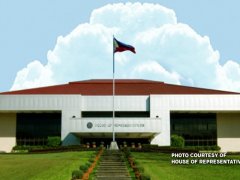News
Lawmakers weigh in on bicam approval of nat’l ID bill

Lawmakers at the House of Representatives on Wednesday weighed in on the approval of the proposed national identification (ID) card system by the bicameral conference committee. (PNA photo)
MANILA – Lawmakers at the House of Representatives on Wednesday weighed in on the approval of the proposed national identification (ID) card system by the bicameral conference committee.
House Appropriations Committee chairman Karlo Nograles lauded the bill’s swift approval at the bicam level, noting that the national ID system could strengthen the country’s campaign against lawlessness including terrorism and drug-trafficking.
“On the first anniversary of the Marawi siege, its very comforting to know that the government is on its way to enforcing a law that will augment our existing security mechanisms,” Nograles said.
“The national ID system will help prevent another Marawi (siege) from happening,” he added.
Following the bicam approval, the bill is now pending ratification by both chambers of Congress, and then it will be up for signing by President Rodrigo R. Duterte.
The Filipino Identification System (FilSys) card is the envisioned all-in-one, machine-readable government card that will store multiple data about the cardholder.
This data can range from tax information, health or social security card details, among others.
The FilSys card may be used in all government transactions including applications for passport, driver’s license, availment of services and benefits offered by insurance institutions, clearances from the courts, prosecutor and the police, and other transactions requiring proof of identification.
Risky system
Gabriela Partylist Rep. Arlene Brosas, however, warned that the national ID system would put everyone at risk if all of people’s information are stored in one database.
“It will be lotto’s grand prize for online criminals and identity theft,” Brosas said.
Brosas said the national ID system also excludes and disenfranchises Filipinos from the marginalized sectors, including indigenous communities to urban poor settlers and street dwellers, who cannot afford yet “another income-generating scheme” as a pre-requisite to availing of basic social services.
ACT Teachers Rep. France Castro, for her part, said the approved bill is a “threat” to Filipinos’ right to privacy.
Another ACT Teachers lawmaker, Antonio Tinio, said the bill might be a tool to “deprive basic social services and discriminate against those who do not have the ID once the law is implemented.”
Tinio said the bill will subject those who do not have an ID to a rigid identification and verification procedure that may hinder the person from getting the social services provided by the government.
“With the tedious process and requirements needed to avail of this ID, there would be people who would not be able to process and afford the Philippine ID like the indigenous people and those in far flung areas,” Tinio said.
Financial inclusion
National Statistician and Civil Registrar General Lisa Bersales earlier said the Philippines is expected to save two percent of its gross domestic product (GDP) over a five-year period with the implementation of the national ID system.
Bersales said it could help plug leakages on social protection benefits, particularly conditional cash transfers (CCT), unconditional cash transfers (UCT), and benefits for senior citizens.
She said the Department of Finance and the central bank are among the advocates of the national ID system for financial inclusion and for giving social protection benefits to the right people without duplicating the services.
Bersales further noted that the citizens would also be the gainers with this national ID scheme as it entails having less numbers of IDs and less transactions with the government for identification papers.
“Studies that we did tell us that with the national ID, saving would be for both citizens as individuals and the government,” she said.





















